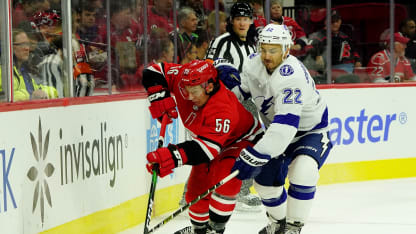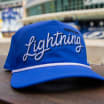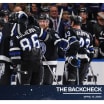The Tampa Bay Lightning surrendered a 3-1 first-period lead to the Carolina Hurricanes in Raleigh Sunday evening, falling 4-3 in overtime.
That loss followed a 4-3 defeat at the Florida Panthers a night earlier for the Bolts.
Tampa Bay dropped both halves of a back-to-back set for the first time since the 2017-18 season, when it lost at Toronto 4-3 on February 12 and then dropped a 5-3 result in Buffalo on February 13.
Burns: 3 Things we learned from back-to-back defeats
Beat writer Bryan Burns recaps the Lightning's 4-3 overtime loss to the Hurricanes on Sunday evening

© Gregg Forwerck/Getty Images
A season after setting franchise records for road wins (30) and road points (62) - and recorded the second-most road wins in NHL history - the Lightning are still looking for their first victory away from AMALIE Arena of the 2019-20 season.
They'll have plenty more opportunities to pick up that road win in the coming days as the Bolts continue on their season long-tying six-game road trip with four more contests away from home against Atlantic Division foes upcoming.
Sunday's loss in Raleigh was a maddening one for the Lightning, who seemingly had control of the game after the first period then couldn't do anything right over the final 40 minutes of regulation.
We'll break down where it all went wrong for the Lightning - as well as the one thing that went right - in Three Things we learned from back-to-back losses.
1. THE LIGHTNING HAD HOW MANY SHOTS?
Tampa Bay racked up 11 shots on net in the first period, scoring on three of those shots when Tyler Johnson found the back of the net 2:22 into the contest to level the score 1-1, Kevin Shattenkirk registered his second goal of the season - as many as he had all of last season with the Rangers - on a power play and Steven Stamkos wheeled into the high slot to wrist a shot past Petr Mrazek unassisted for a 3-1 advantage heading into the first intermission.
The Lightning registered just two shots the rest of the game.
You read that correctly. Tampa Bay was only able to muster two shots in over 40 minutes of play of the second, third period and overtime combined.
The Lightning didn't record a single shot in the second period, getting outshot 17-0, only the fourth time in franchise history the Bolts have gone an entire period without putting a puck on net.
The third period wasn't much better, the Lightning getting a pair of shots on Mrazek early in the final frame on one sequence and failing to threaten the Canes net the rest of the way.
For the game, the Lightning were outshot 44-13.
Hard to score when you don't put any pucks on goal.
That the Lightning were able to find the back of the net three times on just 13 shots is amazing in and of itself.
"Penalties didn't help us," Lightning head coach Jon Cooper said after the game, referring to the five penalties the Bolts took, four of which came after the first period. "You could probably see it coming because I think we had two 2-on-1s and another odd-man rush in the first six minutes of the second and we had the puck the whole time and we never got a shot. And you could see our game went East-West instead of North-South. And that was it."
Penalties hindered the Lightning to be sure.
But there were other issues as well.
Tampa Bay has not passed the puck crisply at all to start the season. In Raleigh, it was even worse. Passes were in skates or ahead of the intended target. At other times, passes were ill-advised and led to turnovers. The Lightning struggled to move the puck through the neutral zone. And when they were able to finally advance the puck into the offensive zone, it quickly came back out.
There was just no rhythm to the Lightning's game once it got a two-goal cushion.
"We played the simple game in the first and the first six or seven minutes of the second, it was no problem. We handled it well," Cooper said. "We just got away from it. Lesson learned."
It's a lesson that needs to crystalize quickly or more of these performances can be expected.
2. WORRIES ON THE PENALTY KILL
Last season, the Lightning led the NHL for penalty kill percentage, the Bolts dispatching 85 percent of their opponents' power plays.
But over the last two contests, the Lightning have given up multiple power-play goals.
And the failures of the penalty kill in those games have led directly to Lightning losses.
In Florida, the Bolts allowed Mike Hoffman to skate all alone in the right circle and shoot past goalie Andrei Vasilevskiy from the exact same spot twice to score a pair of power play goals and put the Panthers up 2-0, a lead they would hold onto in a one-goal victory for the Cats.
The penalty kill struggles continued in Carolina.
With the Lightning nursing a 3-1 lead, Erik Haula jammed home a rebound on a power play to cut the deficit to a goal in the second period.
And as Tampa Bay's offense continued to falter and the Bolts appeared to be just holding on over the final period, Carolina got its break when Braydon Coburn was whistled for a questionable hooking penalty against Warren Foegele, and on the ensuing power play, Dougie Hamilton's shot from the blue line through traffic found a way past McElhinney to level the score 3-3 with just over seven minutes to play.
The Lightning penalty kill is now only 8-for-12 on the season, a 66.7 percent kill rate that ranks tied for 21st in the league.
If Tampa Bay wants to find the win column its next time out, getting better on the penalty kill is a must.
Staying out of the penalty box wouldn't hurt either.
3. RETURN OF THE MACK
Curtis McElhinney set career bests for starts (33), wins (20) and saves (883) last season for Carolina while helping the Hurricanes make it all the way to the Eastern Conference Final.
In his first game against his former squad - and his debut with the Lightning - McElhinney was sensational, stopping 40-of-44 shots in the overtime loss.
McElhinney's 40 saves were tied for the eighth most of his 11-season NHL career.
Without McElhinney's heroics, the Lightning likely would have been staring down a multiple-goal deficit in the first five minutes. After Brett Pesce unleashed an open shot from the slot to beat the Lightning netminder just 1:14 into the contest, McElhinney had to buckle down to keep the Canes from striking again, making several point-blank stops to keep the game from getting out of hand. Johnson's tying goal about a minute after Pesce's settled the Lightning down somewhat, but McElhinney was still called on more than should be necessary to keep the score level.
"It was the Curtis McElhinney show," Cooper admitted.
And then after the Lightning built their lead and the offense disappeared, McElhinney again was the one that kept the damage to a minimum and ensured the Bolts would at least get a point out of the contest that truthfully they probably didn't deserve.
In overtime, there was nothing the veteran netminder could do when Carolina got a 2-on-1 break and Jordan Staal dished off to his right for a wide-open Jaccob Slavin to slam over his glove on a one-timer.
"I think sometimes you get into a situation where you think we did all this work to get control of the game and then we exhale a little bit. And that was it," Cooper said. "That's a good team over there. They've got a really good team. But it's not a 26-minute game. They were hungry and we got complacent and that's what happens."


















